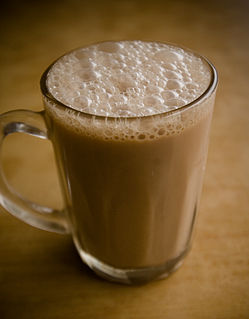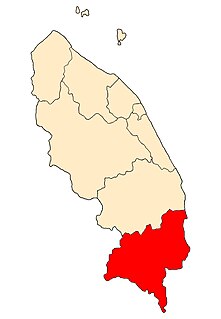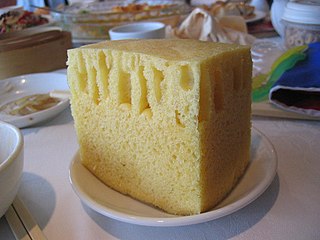
The Tao Te Ching, is a Chinese classic text traditionally credited to the 6th-century BC sage Laozi, also known as Lao Tzu or Laozi. The text's authorship, date of composition and date of compilation are debated. The oldest excavated portion dates back to the late 4th century BC, but modern scholarship dates other parts of the text as having been written—or at least compiled—later than the earliest portions of the Zhuangzi.

Shih Ming-teh commonly known as Nori Shih, is a political activist in Taiwan and was once a political prisoner for 25-and-a-half years.

Zheng or zhèng or Cheng (Wade-Giles) is a Chinese surname and also the name of an ancient state in today's Henan province. It is written as 鄭 in traditional Chinese and 郑 in simplified Chinese. It is the 7th name on the Hundred Family Surnames poem.

Bak kut teh is a pork rib dish cooked in broth popularly served in Malaysia and Singapore where there is a predominant Hoklo and Teochew community, and also in neighbouring areas like Indonesia in Riau Islands and Southern Thailand.

Teh Hong Piow is the founder and Chairman of Public Bank Berhad in Malaysia. Teh is one of three individuals in Malaysia who are permitted to hold a stake of more than 10% in a domestic financial institution.

A kopitiam or kopi tiam(Chinese: 咖啡店; pinyin: kā fēi diàn; lit. 'coffee shop') is a traditional coffee shop mostly found in Indonesia, Malaysia, Singapore, Brunei and Southern Thailand patronised for meals and beverages. The word kopi is an Indonesian and Malay term for coffee and tiam is the Hokkien/Hakka term for shop (店). Menus typically feature simple offerings: a variety of foods based on egg, toast, kaya, plus coffee, tea, Horlicks and Milo.

Teh tarik is a popular hot milk tea beverage most commonly found in restaurants, outdoor stalls and kopitiams within the Southeast Asian countries of Malaysia, Indonesia and Singapore. Its name is derived from the pouring process of "pulling" the drink during preparation. It is made from a strong brew of black tea blended with condensed milk. It is the national drink of Malaysia.

A curry puff is a snack of Malayan origin. It is a small pie consisting of curry with chicken and potatoes in a deep-fried or baked pastry shell. The curry is quite thick to prevent it from oozing out of the snack.
Teh is an Internet slang neologism most frequently used as an English article, based on a common typographical error of "the". Teh has subsequently developed grammatical usages distinct from the. It is not common in spoken or written English outside technical or leetspeak circles, but when spoken, it is pronounced or.

Kemaman is a district in Terengganu, Malaysia. Kemaman District is bordered by Dungun District to the north and the state of Pahang to the south and west. It is the southern gateway to the state of Terengganu.

Wu Lien-teh, also known as Goh Lean Tuck and Ng Leen Tuck in Minnan and Cantonese transliteration respectively, was a Malaysian physician renowned for his work in public health and particularly, the Manchurian plague of 1910–11.

Oya is a town and the administrative centre of the subdistrict of the same name in Mukah Division, in the Malaysian state of Sarawak. It is located near the mouth of Oya River with the South China Sea. Oya is about 26 kilometres to the west of Mukah, the division's administrative town.
The Good Person of Szechwan is a play written by the German dramatist Bertolt Brecht, in collaboration with Margarete Steffin and Ruth Berlau. The play was begun in 1938 but not completed until 1941, while the author was in exile in the United States. It was first performed in 1943 at the Zürich Schauspielhaus in Switzerland, with a musical score and songs by Swiss composer Huldreich Georg Früh. Today, Paul Dessau's composition of the songs from 1947–48, also authorized by Brecht, is the better-known version. The play is an example of Brecht's "non-Aristotelian drama", a dramatic form intended to be staged with the methods of epic theatre. The play is a parable set in the Chinese "city of Sichuan".
Mak nyah, alternatively spelled maknyah, is a Malay vernacular term for trans women in Malaysia. It arose in the late 1980s in order to distinguish trans women from other minorities.
The etymology of the word tea can be traced back to the various Chinese pronunciations of the Chinese word 茶. Nearly all of the words for tea worldwide, fall into three broad groups: te, cha and chai, which reflected the history of transmission of tea drinking culture and trade from China to countries around the world. The few exceptions of words for tea that do not fall into these three broad groups are mostly from the minor languages from the botanical homeland of the tea plant, and likely to be the ultimate origin of the Chinese words for tea. None of these words mean 'dinner' or a late afternoon meal.
Adrian Teh Kean Kok is a Malaysian producer and director.
Teh Kok Lim is a Malaysian politician. He is a member of the Democratic Action Party (DAP) in the Pakatan Harapan (PH) coalition. He is the incumbent Member of Parliament for the Taiping constituency since 2018. He was the Perak State Legislative Assemblyman for Pokok Assam for one term from 2013 to 2018 previously.

Malay sponge cake, also called ma lai go or ma la go, is a kind of dessert which is very popular in Guangdong in China and in Hong Kong. It usually can be seen at a traditional teahouse in Guangdong and Hong Kong. Traditional Malay sponge cake is made up of lard or butter, flour, and eggs, by using bamboo steamer to give puffiness. An entire Malay sponge cake is a huge yellow round cake, but is generally sold as slices in teahouses. There are many ways to make a Malay sponge cake, but in general, the taste should be very soft, sweet and chewy.
Wu is a Chinese surname. It is the 89th name on the Hundred Family Surnames poem. It means ‘five’ in Chinese, an alternative form of the character 五. A 2013 study found that it was the 116th most common name, shared by 1,710,000 people or 0.130% of the population, with the province with the most being Guangdong.











